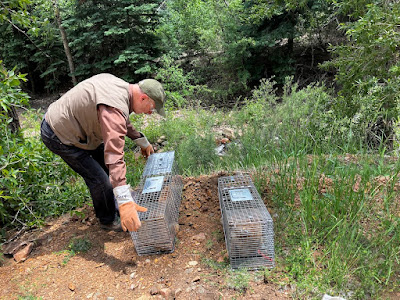 |
| The lone horse grazes at the Blue Heron Ponds near Florence, Colo. |
Sometimes when headed north I stop at some old gravel pits (now full of water) on BLM land by the Arkansas River, now managed by Fremont County as a kind of basic, "undeveloped" park, which is just how I like it, thanks very much. No picnic tables. No soccer fields. Just a few people walking around or fishing for catfish or perch.
Marco likes to swim in the ponds or the river there, and when we walk back and forth, we usually see "the horse," whose caretaker calls him River. It turns how that he has a backstory, as described last September in the Denver Post:
For two years, [Carol[ Stires, 64, has been caring for the abandoned wild horse that’s living on a sliver of public land on the Arkansas River, between Florence and Penrose. At the beginning, she couldn’t get near him. Now, after nearly two years of spending time with River, the mustang comes when called by the name she gave him. He follows her around the park and contentedly grazes a few feet from her.
But the park isn’t a suitable place for the horse. At a little more than 100 acres, there is no fence between the land and the busy highway that forms its western border. Unleashed dogs [not Marco!] chase River, horseback riders spook him and gunshots send him running when hunting season starts in the fall.
The federal agency that manages the park agrees — River shouldn’t be in the park.
Stires has made it her mission to help capture the abandoned horse — to make sure he gets to a sanctuary where he’d have room to roam. If she can’t catch him, she worries the Bureau of Land Management will dart him with a tranquilizer, which could be dangerous.
Where did he come from?
The Bureau of Land Management rounded up the horse from the wild in 2020
in Wyoming and adopted him out, BLM paperwork shows. The person who
adopted River, then 20, used him as a rodeo bucking horse before he
escaped to the park, Stires said. The owners have not captured him.
Another BLM mustang dumped. Everyone says "adopt them," but not too many people want them. Elsewhere in Fremont County, the Colorado Dept. of Corrections is shutting down its 30-year-old program in which inmates halter-break wild mustangs and otherwise habituate them to people to make them more adoptable because the BLM won't pay for it.
Like many other reporters, I wrote about the wild-horse program once. From the prison's viewpoint, it was a good thing -- a prestige inmate job. No one ever leapt onto a mustang and galloped toward the horizon -- from what I heard, such an infraction would have shut down the program; consequently, inmates themselves would have punished the man who wrecked it, if he was caught and brought back inside the walls.
For 30 years, thousands of wild horses captured
in federal roundups have ended up in corrals at a state prison complex
in Cañon City, where they were cared for and trained by inmates through a
program that prepared horses for adoption and provided work experience
for people returning to life after incarceration.
But the program is ending. Citing escalating costs, the federal
Bureau of Land Management has not renewed its contract with the Colorado
Department of Corrections for the mustang program.
The 2,073 horses at the prison complex will go to holding facilities in
Wyoming or Utah, minus about 100 animals that were captured in
Colorado.
From what I read, there are about as many mustangs standing around in pens as out on the range. The land managers are caught inside an Iron Triangle:
1. Just leaving mustangs on the public lands angers ranchers who lease grazing rights and wildlife biologists and hunters who see them competing with wild game.
2. Killing them on the range angers the horse cultists, who see horses as intrinsically morally better than cattle, elk, mule deer, etc.
3. Sending the excess horses to slaughterhouses invokes #2 as well. Adoption rules had to be written to keep people from adopting the mustangs and then selling them for slaughter.
This is not just a Trump Administration problem; it has been growing for decades. There are more "pleasure horses" in America than there people who want to own and care for them. Dump in thousands more half-broke, cheaper mustangs that come with certain rules, and the problem worsens. Yes, there are some "wild horse sanctuaries," but not enough for all the horses stagnating in BLM holding pens.
So Rain the elderly mustang ends up dumped "("escaped") in a public park, where, to my mind, his life has not been too bad, but management does not want him there.
























.jpeg)